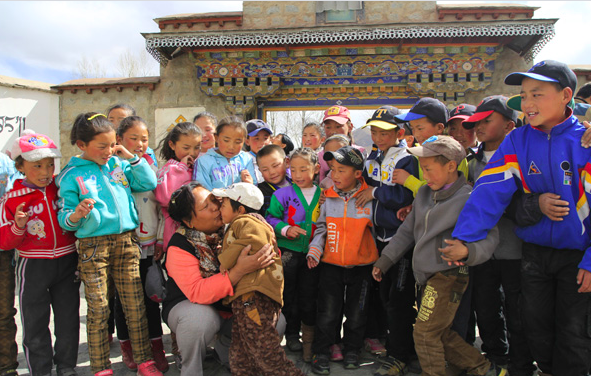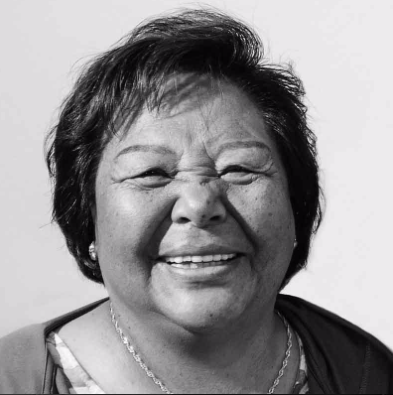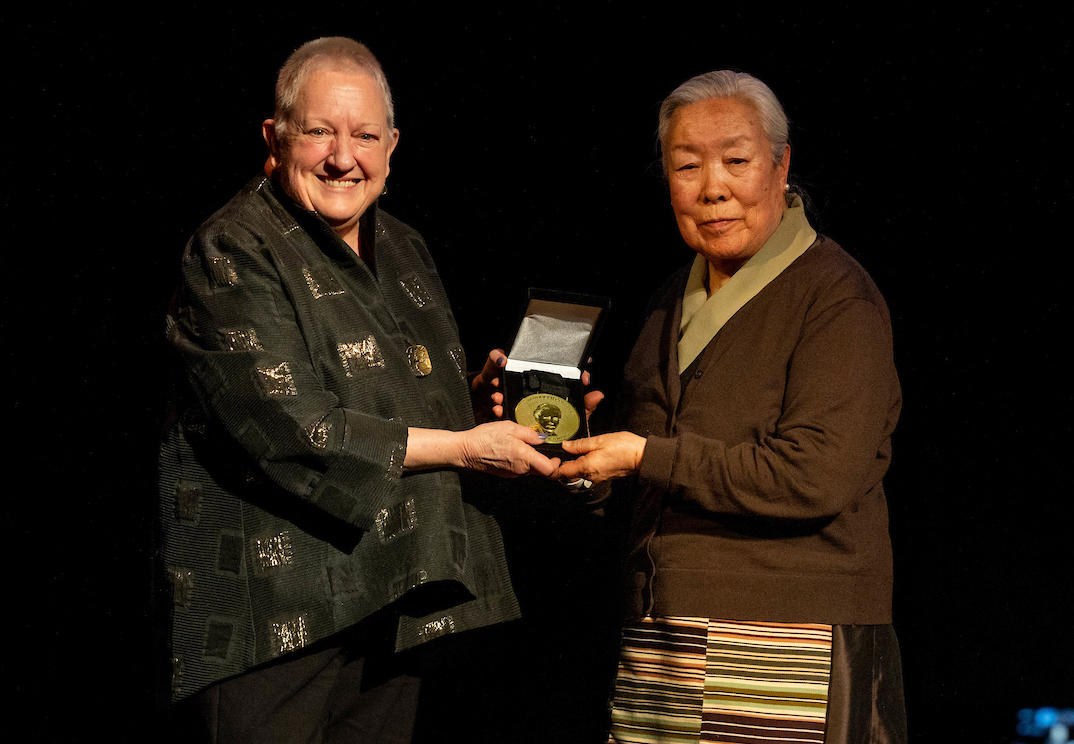By Morris Tennyson
A Tibetan girl orphaned while fleeing the 1959 uprising who later returned to care for abandoned children in Tibet died on Sunday 3 May in Switzerland from COVID-19.
Tendol Gyalzur established the first private orphanage in Tibet just outside Lhasa in 1993, later setting up another orphanage in the Kham region’s Gyalthang (Shangri-la in Diqing Tibetan Autonomous Prefecture) and a centre for the children of nomadic herders in Litang in western Sichuan.
Credited with caring for over 300 children over 25 years, Tendol fulfilled a wish and prophesy of the 14th Dalai Lama when he spoke to her and other children who were being sent to Europe in the hope of later being able to assist their fellow Tibetans in back in Tibet. Addressing the group of children selected from refugee camps, His Holiness in Dharamshala told them they were the seeds of flowers that would one day bloom in Tibet. “Share your happiness with others, he said, share your happiness,” Tendol recalled one of her early memories.
So how did an exiled orphan return from Switzerland to establish orphanages and nomadic schools across Tibetan areas? The short answer is that was obviously very hard work, requiring dedication, perseverance, and unlimited love. Tendol was supported by her family, especially her husband and oldest son, who moved across the world to help her, as well as donors in Europe, North America, and throughout the world.
Tendol was possibly the kindest-hearted person you might ever meet. Yet given her turbulent displaced childhood, you might expect her to hold a grudge against those who orphaned her. She was born in Shigatse, though she doesn’t know the day or even which year.

She had every reason to have hatred towards the Chinese. Her parents and brother were killed in 1959 during the suppression of the uprising against Chinese rule in Tibet as they tried to escape across the Himalayas to Bhutan and onto India. The uprising left tens of thousands dead and saw over 80,000 Tibetans, including the 14th Dalai Lama, flee to India. It was through the Dalai Lama’s intervention and protective care that she was selected from a refugee camp in India, and re-settled in Europe. She was sent to an orphanage in Germany, where she was adopted by a young German couple, both doctors, near Konstanz, growing up with 11 other Tibetan orphans. As well as suffering culture shock and racial abuse, her less traumatic early memories include being invited to lunch with the mayor of Munich only to be served a bland meal of hominy grits, and being sick from eating too much chocolate at Easter.
In Germany, she met her husband, Losang, a fellow Tibetan refugee who had fled to Switzerland in 1972. They moved to near Zurich in Switzerland, the country with one of the largest populations of Tibetans, and started a family. One of her sons went on to become a professional ice hockey player in Switzerland. Songtsen later established one of the world’s highest altitude craft breweries, while Ghaden is a management professional in Switzerland who has helped with his mother’s charity.
When her sons were still teenagers, and when Tendol was in her mid-30s, she returned to Tibet for the first time in 1990, this time bearing the distinctive bright red Swiss passport with its bold white cross. While other visitors in the capital Lhasa were marvelling at the enchanting Tibetan Buddhist architecture and magnificent high-altitude scenery, she came across two dishevelled children rummaging through rubbish for food scraps in the shadow of the Potala Palace. She took them to a nearby place to eat, but at first, the manager refused to let them in. “It was then, for the first time in my life, I realised that the only thing I wanted to do was fight for the rights of these abandoned children,” she said. “I know there are orphans all over the world, but I am Tibetan, and I wanted to help the orphans of Tibet.”
When she described her vision of establishing an orphanage in Tibet to her family and friends back in Switzerland and Germany, many argued it was an impossible dream. After all, she was just a surgical nurse, with little money, up against seemingly insurmountable obstacles to set up a private institution in bureaucratic and xenophobic Communist China.
Haunted by the images of the scavenging Tibetan street-children, which triggered her own memories of being an orphan, she took out her savings and some of her husband’s pension, sought donations and loans from family and friends, and secured some support from the Tibet Development Fund, which helped find free land for the project. Within three years of that pivotal moment in Lhasa, she returned in 1993 to open Tibet’s first private orphanage at Toelung just outside Lhasa. It started with just six children.
She opened a second orphanage in her husband’s hometown of Shangri-la in 1997, and five years later established a centre in western Sichuan for the children of nomadic herders.
In Shangri-la, the spacious compound featured a basketball court, stables for horses, flower gardens, with decorative Tibetan motifs around the buildings. Rather than being schooled in the orphanage and institutionalised, the children went to school nearby and saw the orphanage with dormitories, classrooms, a kitchen and performance hall more like a family home. Despite being abandoned or not knowing their parents, the children referred to each other as brother or sister, calling Tendol their mother or aunty. Unlike state-run or private orphanages across China, which often put up children for adoption, Tendol didn’t want to add this uncertainty into the lives of her children.
In Tibetan-dominant Shangri-la, which sits in northwest Yunnan province at 3,300m elevation, the orphanage muster reflected the Tibetan borderland diversity, with seven different ethnic groups including Han Chinese calling the orphanage their home. “We don’t discriminate on the ethnic origin, the colour of skin, or religion, instead we accept those who are most in need of our help and protection.”
Concerned about the loss of Tibetan language and culture, Tendol enlisted volunteers to teach after-school and in the weekends, with children also learning traditional songs and dances. Having been brought up in Europe with Christian values, Tendol didn’t impose any belief system onto the children at the non-denominational orphanage, saying that rather than being exclusively Tibetan Buddhist or Christian, the orphanages were not religious. In an interview she once said her work was practical and pragmatic, ‘my religion is wiping children’s noses’.
One of those impressed by Tendol’s drive was Rick Montgomery, who first met her in 2001. “She is one of the most amazing, selfless women I have ever met. Her work inspired me to start Global Roots, which supports charities across the world.”
Tendol’s charity was aided by supporters in Europe, particularly in Switzerland, Germany, Austria and France, with some donors visiting the orphanages in Lhasa and Shangri-la to see for themselves the caring environment created with gardens, house-parents, pet animals and volunteers. Tendol travelled between the three endeavours, heading back to Switzerland to report on progress and raise more funds for expansion (both Lhasa and Shangri-la facilities were home to over 50 children), better facilities, and in some cases, medical operations for young residents.
With Losang an accomplished horseman, a number of the children learned the skills of Tibetan horse riding, winning prizes at Shangri-la’s annual horse-riding festival, one of the largest events in the eastern Tibet region.
As the children in the orphanage grew older, some went on to tertiary study, apprenticeships and jobs. Some studied the Tibetan language in Xining or were accepted into universities. One of the former orphans from her Lhasa home became a house parent in Shangrila. Some former residents went on to marry, start families and have careers, with Tendol and Losang attending weddings as ‘parents’ and later becoming ‘grandparents’.
In 2008 Tendol’s oldest son Songtsen moved to Shangrila, establishing two cafes and a brewery making Shangri-la Beer. Around 80% of the staff at Shangri-la Highland Craft Brewery, China’s first fully-licensed craft brewing company, is from the orphanage, with the cafes involved in training schemes to give skills useful in the tourism-dependent economy, which switched from forestry to tourism in the late 1990s following floods along the Yangtze River – the Chinese name Zhongdian was changed to Shangri-la in 2002 in a shrewd move to attract tourists in search of the fictional place of James Hilton’s Lost Horizon.
The orphanage was listed in some travel guidebooks such as Lonely Planet, recommended as an organisation fostering awareness of Tibet and aiding the Tibetan people. Foreign volunteers were sometimes able to assist at the orphanage, entertain the children, or undertake research.
Over the years the authorities became more accepting of Tendol’s endeavours and were impressed at the quality of care provided at the person-centred facilities, later helping fund additional teacher salaries and contributing to clothing, food, housing and transportation expenses. With nationwide changes to the administration of orphanages, more onerous reporting requirements for foreign NGOs, and the better provision of social services, Tendol and Losang (who had both passed the 65-year retirement age) closed the Lhasa and Shangri-la orphanages in 2017 and 2018, with the remaining children now cared for by the official orphanages.
Last year the story of her efforts was told by Tanja Polli in “A Life for the Children of Tibet – The incredible story of Tendol Gyalzur” (www.woerterseh.ch/produkt/ein-leben-fuer-die-kinder-tibets/), published in German by a Swiss imprint.
As the news broke of Tendol succumbing to COVID-19 spread around the world, there have been many tributes paid to her on social media in several languages, with the local media in Shangri-la praising her selfless dedication to welfare, and saying she was a great inspiration to others.
Tendol is fondly remembered not just as big-hearted mother to many, or for her achievements in establishing centres of love for vulnerable children, but also for how she went about her mission, a flower brightly blooming in Tibet. Finding meaning in serving others, Tendol often shared with visitors how she found joy in caring for her children. “I am the happiest person on Earth.”
The author has received consent from the family of the late Tendol Gyalzur for the piece.











11 Responses
ཨེ་མ་ཧོ༔ ངོ་མཚར་སངས་རྒྱས་སྣང་བ་མཐའ་ཡས་དང༔ གཡས་སུ་ཇོ་བོ་ཐུགས་རྗེ་ཆེན་པོ་དང༔ གཡོན་དུ་སེམས་དཔའ་མཐུ་ཆེན་ཐོབ་རྣམས་ལ༔ སངས་རྒྱས་བྱང་སེམས་དཔག་མེད་འཁོར་གྱིས་བསྐོར༔ བདེ་སྐྱིད་ངོ་མཚར་དཔག་ཏུ་མེད་པ་ཡི༔ བདེ་བ་ཅན་ཞེས་བྱ་བའི་ཞིང་ཁམས་དེར༔ བདག་ནི་འདི་ནས་ཚེ་འཕོས་གྱུར་མ་ཐག༔ སྐྱེ་བ་གཞན་གྱིས་བར་མ་ཆོད་པ་རུ༔ དེ་རུ་སྐྱེས་ནས་སྣང་མཐའི་ཞལ་མཐོང་ཤོག༔ དེ་སྐད་བདག་གི་སྨོན་ལམ་བཏབ་པ་འདི༔ ཕྱོགས་བཅུའི་སངས་རྒྱས་བྱང་སེམས་ཐམས་ཅད་ཀྱིས༔ གེགས་མེད་འགྲུབ་པར་བྱིན་གྱིས་བརླབ་ཏུ་གསོལ༔ ཏདྱཐཱ༔ པཉྩནྡྲི་ཡ་ཨ་ཝ་བོ་དྷ་ནི་སྭཱཧཱ༔
Rest In peace.
Om ma ne padme hu
Om mani padme hum
may you be swiftly reborn as a human again in the land of the snow without any hindrances….
Swiss Tibetans have done really well in helping directly in Tibet. Late Tawo Lobsang Palden has done a wonderful job building schools in Tibet. She has also done similar things. I think we need more people going directly to tibet and help. If we done, there is a danger of losing psychological connection with Tibet, and we will begin to see Dharamsala as Tibet and everything that has to do with Tibet.
How fortunate I am to have met late Tendon Gyalzur-la, husband Losang-la & elder son Songtsen-la. They stayed at my hotel (Garuda) while on their way to Tibet.
I have visited her Lhasa orphanage during one of my several Tibet tours and was very moved by her compassion and dedication towards the destitutes.
Her sudden death shocked me because my wife & I met the couple in mid January 2020 in Marriot Hotel, Kathmandu.
What a wonderful life, in the right way of buddhism…
I didn’t know this extraordinary woman.
i’ll keep her in my prayers, and hope very profoundly she will rebirth in Dewatchen. Tcheu Drön.
She was a mother that we all need to remembger. May she be reborn as a tibetan and meet all her children. May god bless her soul. May she reborn under the bless of His Holiness the Ddalai Lamaa.
This is very heart warming story, feel proud to know that a Tibetan refugee woman was able to do such great selfless work. This is the essence of Buddhist spirituality. Helping one another without any expectation of personal gain. You have achieved and done what we all are supposed to be doing.
The only woman who worked tirelessly for Tibetan children in Tibet, who is my living dakini and angel. Thank you from the bottom of my heart.
Om Mani Padme Hum